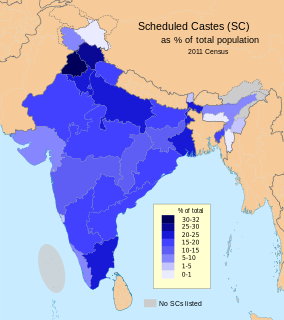Other Backward Class (OBC) is a collective term used by the Government of India to classify castes which are educationally or socially disadvantaged. It is one of several official classifications of the population of India, along with Scheduled Castes and Scheduled Tribes. The OBCs were found to comprise 52% of the country's population by the Mandal Commission report of 1980, and were determined to be 41% in 2006 when the National Sample Survey Organisation took place. There is substantial debate over the exact number of OBCs in India; it is generally estimated to be sizable, but many believe that it is higher than the figures quoted by either the Mandal Commission or the National Sample Survey.

The Scheduled Caste (SCs) and Scheduled Tribes (STs) are officially designated groups of people in India. The terms are recognised in the Constitution of India and the groups are designated in one or other of the categories. For much of the period of British rule in the Indian subcontinent, they were known as the Depressed Classes.
In March 2005, the then Prime Minister Manmohan Singh had constituted a seven-member High Level Committee headed by former Chief Justice of Delhi High Court Rajinder Sachar to study the social, economic and educational condition of Muslims in India.The committee submitted its report in 2006 and the report was available in public domain in November 30, 2006. The 403-page report had suggestions and solutions for the inclusive development of the Muslims in India.
The Ministry of Tribal Affairs, a branch of Government of India, looks after the affairs of the tribal communities in India.
The Ministry of Minority Affairs is a ministry of the Government of India which was carved out of Ministry of Social Justice and Empowerment and created on 29 January 2006. It is the apex body for the central government's regulatory and developmental programmes for the minority religious communities in India, which include Muslims, Sikhs, Christians, Buddhists, Zoroastrians (Parsis) and Jains notified as minority communities in The Gazette of India under Section 2(c) of the National Commission for Minorities Act, 1992.
The Ministry of Social Justice and Empowerment is a Government of India ministry. It is responsible for welfare, social justice and empowerment of disadvantaged and marginalised sections of society, including scheduled castes (SC), Other Backward Classes (OBC), the disabled, the elderly, and the victims of drug abuse.
The Ministry of Women and Child Development, a branch of the Government of India, is an apex body for formulation and administration of the rules and regulations and laws relating to women and child development in India. The current minister for the Ministry of Women and Child Development is Smriti Irani having held the portfolio since 31 May 2019.

Bezwada Wilson is an Indian activist and one of the founders and National Convenor of the Safai Karmachari Andolan (SKA), an Indian human rights organization that has been campaigning for the eradication of manual scavenging, the construction, operation and employment of manual scavengers which has been illegal in India since 1993. His work at SKA, a community-driven movement, has been recognized by the Ashoka Foundation which has nominated him a Senior Fellow. On 27 July 2016, he was honoured with the Ramon Magsaysay Award.
India's National Commission for Backward Classes is a constitutional body under India's Ministry of Social Justice and Empowerment established on 14 August 1993. It was constituted pursuant to the provisions of the National Commission for Backward Classes Act, 1993.
National Scheduled Castes Finance and Development Corporation (NSFDC) was set up in 1989 as a non profit company under Ministry of Social Justice and Empowerment, Government of India for financing, facilitating and mobilizing funds for the economic empowerment of persons belonging to the Scheduled Castes families living below double the Poverty Line.
The National Commission for Scheduled Castes is an Indian constitutional body established with a view to provide safeguards against the exploitation of Scheduled Castes and Anglo Indian communities to promote and protect their social, educational, economic and cultural interests, special provisions were made in the Constitution. Article 338 of the Indian constitution deals with National Commission for Scheduled Castes. Article 338 A deals with National Commission for Scheduled tribes.
The National Commission for Safai Karamcharis (NCSK) was formed as a statutory body to look into matters concerning the Safai Karamcharis’ welfare and makes recommendations to the government. For the first time, NCSK was constituted as a statutory body under the NCSK ACT, 1993. This commission continued till February 2004, when the relevant Act expired. Thereafter, the tenure of the commission has been extended from time to time, as a non-statutory body, the last such extension being up to 31 March 2022.
National Backward Classes Finance & Development Corporation (NBCFDC) was incorporated 13 January 1992 as a non profit company under the Ministry of Social Justice and Empowerment, Government of India to improve and develop the economic activities for the members of Backward Classes who are living below double the poverty line.
National Handicapped Finance and Development Corporation (NHFDC) was set up in January 1997 as a not for profit company under Ministry of Social Justice and Empowerment, Government of India. The corporation provides financial assistance for wide range of income generating activities to disabled persons.
National Minorities Development and Finance Corporation (NMDFC) was incorporated in September 1994 as a non profit company under Ministry of Social Justice and Empowerment, Government of India to provide concessional finance for self-employment activities to eligible beneficiaries belonging to the minority communities, having a family income below double the poverty line.
Manju Bharat Ram was an Indian educationist, who was the founder, chairperson of the managing committee and member of the board of trustees, The Shri Ram Schools, New Delhi; ranked as India's No. 1 day school by Education World’s Schools survey in 2008, 2009 and 2011.
Nidan is a non governmental organization which facilitates empowerment of the poor and marginalized sectors through community services and pro-poor participative interventions. Nidan has been intensively working with the people employed in unorganized sector in the states of Bihar, Rajasthan, Delhi and Jharkhand. It has two head offices located in Patna and West Vinod Nagar.
Accessible India Campaign or Sugamya Bharat Abhiyan is a program which is set to be launched to serve the differently-able community of the country. The program comes with an index to measure the design of disabled-friendly buildings and human resource policies. The flagship program has been launched by the Prime Minister on 3 December 2015, the International Day of people with Disabilities. The initiative also in line with the Article 9 of the to which India is a signatory since 2007. The scheme also comes under Persons with Disabilities Act, 1995 under section 44, 45, 46 for equal Opportunities and protection of rights which provides non-discrimination in Transport to Persons with Disabilities.

Ira Singhal is an Indian Administrative Service officer. She was the highest scoring individual in the UPSC's Civil Services Examination for the year 2014. She completed her B.Tech. from Netaji Subhas Institute of Technology, University of Delhi. Singhal topped the exam in her fourth attempt, to become the first differently abled woman to top the civil services exam in the general category.


